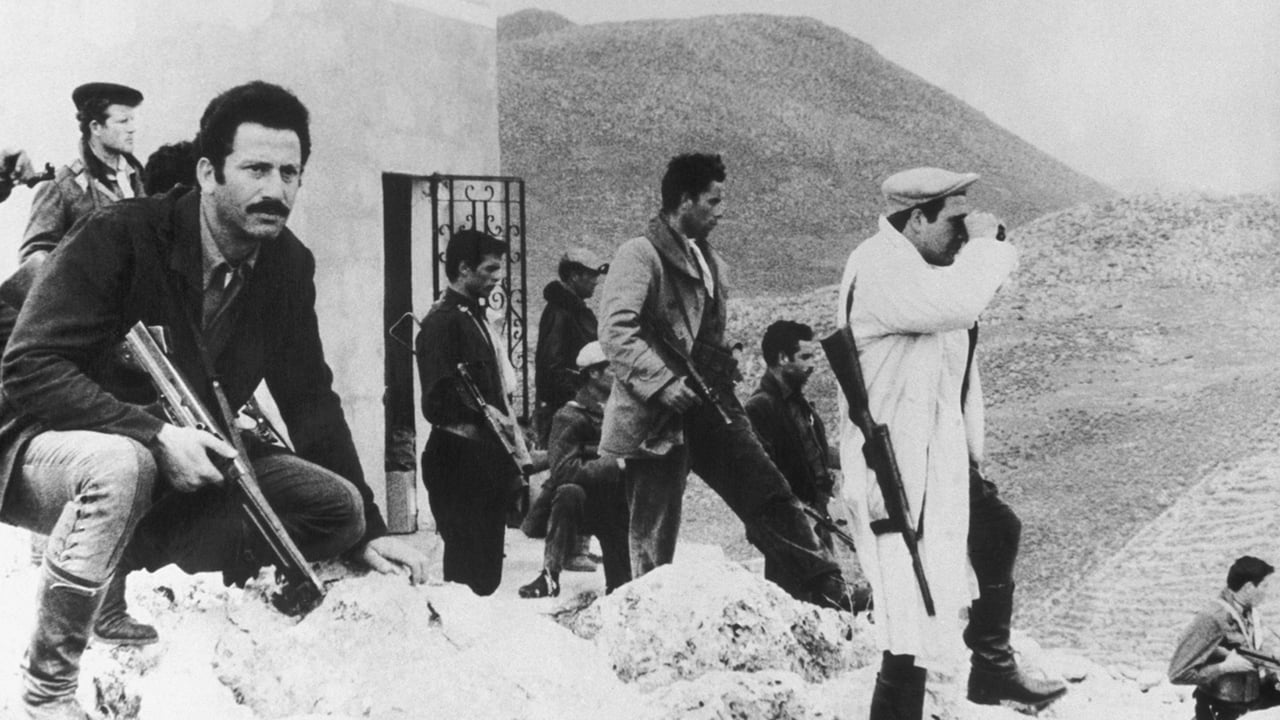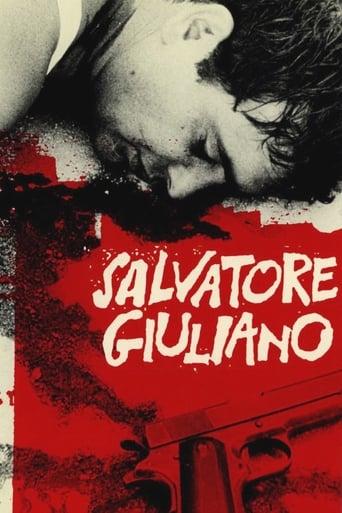

In order to really evaluate this film, I would have to be a knowledgeable Italian leftist. I'm not. I knew who Giuliano was, but the structure of the film still kind of threw me for a while. But I think I can say a couple things which might help the next person who is thinking of seeing it.First: it helps a lot if you know something about Giuliano and about the political situation in Italy and in Sicily at the end of World War II before seeing the movie. Francesco Rosi made this movie a few short years after Giuliano's killing and the subsequent trials. His audience had heard a lot about Giuliano and didn't have to be given the whole backstory about him and about the last 15 years of Italian politics. The viewer today, however, particularly outside Italy, could use some of it. Check out the Wikipedia article at least.Second: if you expect a movie about a charismatic bandit setting traps for the law, you'll be surprised, because the movie really doesn't focus on his career as a leader of a bandit gang / separatist guerrilla force at all. It starts with Giuliano's body lying in a courtyard, and officials telling reporters a story about how he died. During the first half of the film we jump back some to some incidents, and then about halfway through we leave all that behind and go forward into the investigations and trials of accused members of his band after Giuliano's death.Furthermore, Rosi rather veils his views about Giuliano. We learn that secessionist politicians saw him as sort of a desperate hope, that the people of his town mostly liked him and that the big cheeses mostly hated him, but Rosi keeps his distance. The key incident from the point of view of the succeeding criminal trials is the massacre at Portella della Ginestra of peaceful persons attending a May Day rally. We see Giuliano's band moving out to "shoot at some Communists"; later, as the crowd listens to talk about getting land and education for their children, there are a couple volleys of bullets, and then a third one, from the arid distance, which cuts down a score of completely innocent people. The camera does not minimize this crime, but Rosi is vague about whether he thinks Giuliano intended this result, or that it was unintended by him or even a frame-up by other parties.Third: while Rosi keeps Giuliano at a distance, he makes it very clear what he thinks of the Italian state. We see that their promises of amnesty to the separatists were worthless. We see carabinieri raiding a village and carting men away pretty much indiscriminately. We see that their stories about how they heroically shot Giuliano in a fire fight are lies. We see that legal procedure silences competing stories and takes the place of a true investigation of Giuliano's life and death. We hear stories of a secret alliance between the state and the Mafia. Giuliano is dead, his forces are in jail or dead or disbanded, but all these horrible people and sinister forces in and around the state apparatus are alive and the real focus of Rosi's agitation.All this makes perfect sense to me if I try (of course with no hope of getting it exactly right) to put myself in the position of a leftist agitator (anyone who thinks I intend to belittle Rosi by thinking of the film in this way doesn't grasp how I view leftist agitation) in 1961, trying to deal with the tales and memories of Giuliano and sorting out the lessons I do and don't want people to remember. On the one hand, Giuliano took on the Italian state and was seen as a Robin Hood character. On the other hand, he was quite anti-communist even if you give him the benefit of all the doubt there is regarding Portella della Ginestra; he hung out with monarchists and wanted to get Sicily annexed by the Truman administration! So if you are Rosi, you are not at all interested in trying to revive Giulianism or revere Giuliano. You are interested in starting with the fact that your audience maybe has fond feelings about him and understands where he came from, but in moving on from there into a present-day critique of the police, the military, and the Mafia. And for me this answers a lot of questions about why this film is organized the way it is. Rosi wants people to remember, for example, the heroic black-clad village women, trying to take on the carabinieri in a hand-to-hand fight to get their men released. There are more people in that fight than in Giuliano's whole band at its highest point.Those are some notes that will perhaps (who knows) be useful for a non-Italian viewer trying to get into this film. As for a full review of the film, I don't claim to be competent to do it. I'm glad I got around to seeing it, though.
... View MoreThrough the first hour of this film there are no focused characters, at most a character is seen in two or three short scenes. It's basically just following history and showing examples of it. Luckily it's not rushed, it's decently paced and it is realistic.The best way to describe this is to call it a docu-drama. A narrator tells you something and then some people either do what's described or continues where the narrator leaves off. Though this approach can work, I did find it distancing in this film and it did make me less interested. The above competent direction and photography did elevate it however and for a long time I felt that it was great.The films main problem is that we never really get to know anything, least of all about the title character who is despite the entire film being about his history only seen dead, or walking/running around. He only has a few lines.Then towards the middle we experience two horrendous acts of overacting which damages the film severely. Both involving screaming/crying, the worst offender was the woman playing Giulianos mother. She screams and cries so awfully and in such a high tone that you wonder if you are watching a cheap parody. This scene is agonizingly long.We do however learn a lot about the conflict going on and after a bit more than an hour, perhaps closer to 90 mins we get one character to follow. Overall I just don't think the film put us inside the conflict and despite giving us historical facts and let us understand the events we never got to the core. This made it cold and somewhat uninteresting for time to time. Not a film I would recommend but definitely a more or less good film.6.5/10
... View MoreFilmed in the actual Siciilian locations, this film is a fair attempt to strip away the myth surrounding bandit-cum-revolutionary Giuliano. In fact, he doesn't appear except as a gunned-down corpse at the beginning. The film winds back to unravel the events leading to his death, and forwards to its consequence. This is a clever method of achieving objectivity while at the same time subtly emphasising the man's elusive and mysterious qualities. To show Giuliano would have either been either hagiography or iconoclasm. The film rose above that and broadened its inquiry into the wider social and political context, effectively belittling him as the puppet of various forces jostling for position in Sicily after the war: bandits, police, local aristocracy, the Italian government, communists, and the Mafia.This sets quite a challenge for itself, partly because of the vacuum at its centre, partly because of the obscurity and complexity of the real events. We are delivered to a chaotic courtroom to try to piece it together. The film finally latches onto Giuliano's lieutenant the only one who seems to know something of what is going on - but even he is silenced. It's all the more disturbing for the confusion. Rosi is one of the best directors of crowds scenes and he gives raucous energy to any gathering of men, especially in the courtroom. He induces a kind of group hysteria in his actors; they are totally unaware of the camera and the result is an almost disturbing hyper-real feel (real crowds are dull in comparison) it's really something to appreciate. To get into this film, you need to invest something in the passions of the various parties involved - if not sympathise with them, then at least understand them. Without this, the danger is that it all boils down to so much petty bickering. The same might be said of the Godfather, which clearly owes a huge debt to Rosi's style.Influential then, somewhat brave, with some fine directorial moments, and an interesting history lesson. Hard to actually like, but hard not to admire.
... View MoreA perfect analysis of the most famous gangster, loved from the poor people, of Sicily. Is very good the acting of Frank Wolff as the cousin of Giuliano, Salvatore Pisciotta. On this Film there is the same history of the gangster of the Film "Il Siciliano" with C. Lambert, but here the film is history, there the film is a bad novel.
... View More